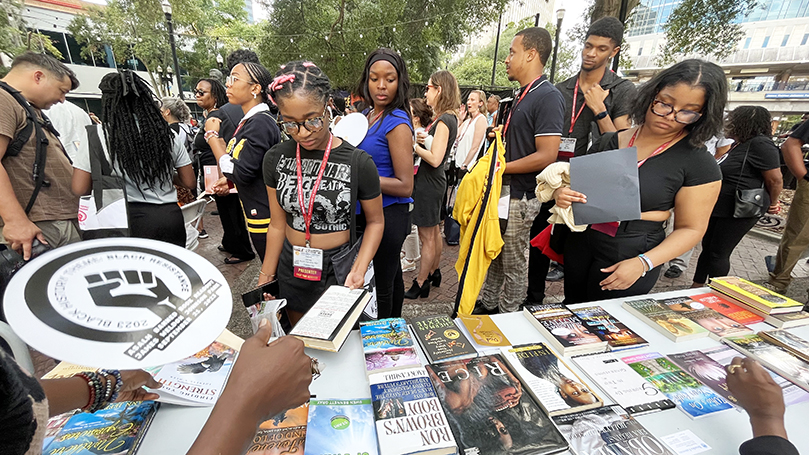
“In some places, they put up all these statues.
You know, like all these Confederate monuments
and statues you see everywhere.
All the lot of ’em is put up right on top of a slave burial field. …
“It’s like taking one history
and putting it right on top of another.
It’s like taking one man’s legacy,
putting it on top of another.
Till, one day, it gets pushed down so deep
buried so deep…
…can’t no one ever find it no more.”
– Ruben Soames in “The Burial” (2023) by Maggie Betts
Hundreds of historians from all over the country came to Jacksonville, Florida at the end of September to push up that buried history by sharing their research on the lives and history of African Americans. Jacksonville produced a long list of civil rights heroes. It’s an annual event hosted by the Association for the Study of African American Life and History (ASALH), chock full of lectures, seminars, workshops, and plenaries. But this year added something new. All presentations put heavy emphasis on the history of resistance. There were panel discussions on “Practices of Righteous Dissent,” “Black Women’s Biography as Resistance,” “Black Student Resistance” and “Trans-Imperial Histories of Black Resistance.” Perhaps most important, a number of workshops focused on how to teach Black History in this era, including a specially designed toolkit to help community members lead discussions on racial and social justice issues.
In fact, the very presence of ASALH in Jacksonville was a demonstration of resistance. In addition to the regular fare, there was a public forum at a local church to discuss why a community must justify teaching Black history and its value. And a public park in the heart of Jacksonville, named after James Weldon Johnson (NAACP leader and composer of the Negro National Anthem “Lift Ev’ry Voice and Sing”), was the site of the Banned Book Readout. Educators joined community leaders to read, out loud, excerpts from literature like “The Bluest Eye” by Toni Morrison, “Soul on Ice” by Eldridge Cleaver, and “The Hill We Climb” by Amanda Gorman. This is despite the draconian steps Florida and its fascist governor have taken to gag such speech.
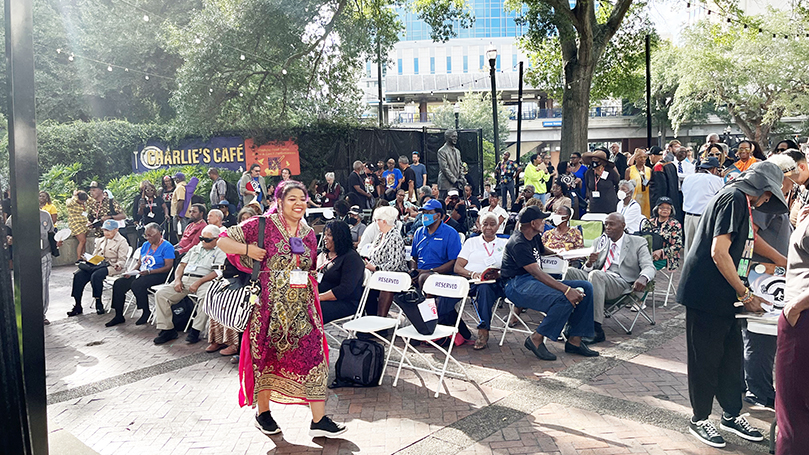
Over the past 10 months, lawmakers passed a rash of legislation specifically targeting people of color. Then, just three weeks before the conference, Jacksonville’s Black community was plunged into terror when an avowed racist shot and killed three Black people near an HBCU, Edward Waters College. Historians could not miss the irony. The shooting happened on the 63rd anniversary of Ax Handle Saturday. Also known as the Jacksonville riot of 1960, the incident involved 200 white men who attacked a number of Black students protesting the segregation of lunch counters, viciously beating them and any Black person who got in the way.
There is a good deal of evidence that the gunman who slaughtered those three people was emboldened by the fascistic “anti-woke” crusade raging in the state today. His online writings spewed hate, murder and racism. It’s not hard to imagine how he was fortified by the political climate. In less than a year, the state of Florida:
- Demanded that the College Board eliminate content dealing with the struggle for African American and LGBTQ equality from its Advanced Placement curriculum,
- Passed legislation requiring middle school students to learn “how ‘slaves’ developed skills which, in some instances, could be applied for their personal benefit,”
- Passed a law that contained a provision undermining voter registration drives by community organizations,
- Mandated more book bans than any other state, amounting to more than 40% of all book bans in the country, and
- Launched a political and cultural attack on the rights and dignity of African Americans, immigrants, Latino and LGTBQ people so ferocious that the NAACP, LULAC, and Equality Florida were forced to issue travel advisories to these communities.
The civil rights organizations’ warnings technically aren’t boycotts, but the message is clear. Under Gov. Ron DeSantis’ leadership, Florida has become, as the NAACP put, “openly hostile toward African Americans, people of color and LGBTQ+ individuals.”
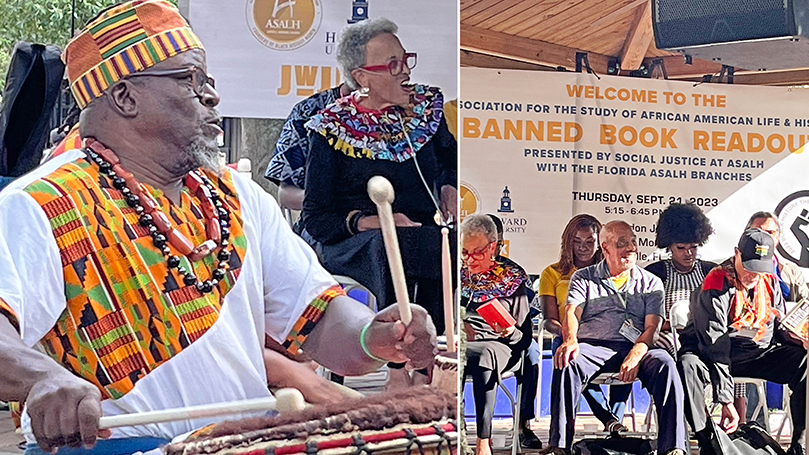
So, many wondered: Why would Black historians choose to book their conference in Florida? ASALH president Marvin Dulaney called it “running to the fight,” because “you can’t outrun a fight that keeps giving chase.”
The “fight” appears on the surface to mainly be about history and education. Many mainstream accounts of the anti-woke crusades in Florida focus on how teaching about the history of slavery in U.S. public schools might make some children feel uncomfortable or guilty (rather than focusing on the benefits of confronting that history). Those reports seem to support Governor (and presidential candidate) Ron DeSantis’ in his efforts to present himself as someone who is protecting the children from the rapacious radicals who are trying to “indoctrinate” children with the poison of their views. Who is indoctrinating whom?
What’s really behind DeSantis’ rage and furious indignation is a frantic and aggressive campaign to maintain the racist structures and ideas that help keep capitalism running. An important battle front in this campaign is education, specifically historical education. It’s already difficult or impossible for many African Americans to find their family history due to a dearth of records prior to the 1870 census. Records that do remain are often vague, illegible or damaged beyond usefulness. Now we are faced with an aggressive attack aimed at suppressing struggles to research and popularize Black History as a whole. DeSantis wants to be the victor who rewrites history in the interests of the rich and powerful who seek to maintain their rule through open violence and oppression.
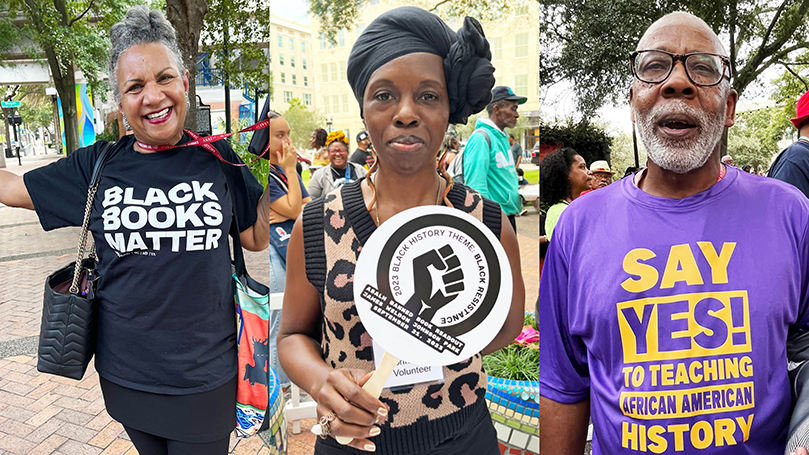
One thing DeSantis has right is that if you control education, you control the people. As Maya Angelou has written, “If you don’t know where you’ve come from, you don’t know where you’re going.” DeSantis’ aim in burying the record is to write a history that extolls the virtue of the system and “white washes” the stories of the victims of the system. Revising history is an age-old tactic most brutally executed by fascists like Francisco Franco or Paul Joseph Goebbels.
So, Florida’s curriculum barely gives a nod to the pre-colonial history of Africa’s vibrant kingdoms or the stories of African American intellectuals, artists, and political activists, some of whom were advisors to U.S. Presidents. Hence, the idea in the Florida-mandated Black History curriculum that “slaves” profited from slavery by gaining valuable on-the-job training.
Looking at the relationship between capitalism, slavery, and racism, it’s not hard to understand why DeSantis and his ilk want to bury Black History in a racist revision of U.S. history. Marx himself elaborated on this relationship, observing that slavery reaches “its most hateful form … in a situation of capitalist production” in which “exchange value becomes the determining element of production.” Reflecting on this, sociology professor Kevin B. Anderson writes, “This leads to the extension of the workday beyond all limit, literally working enslaved people to death.”
In The Poverty of Philosophy, Marx writes:
“Direct slavery is as much the pivot upon which our present-day industrialism turns, as are machinery, credit, etc. Without slavery there would be no cotton, without cotton there would be no modern industry. It is slavery that has given value to the colonies, it is the colonies that have created world trade, and world trade is the necessary condition for large-scale machine industry.”
Capitalism and slavery came to rely on the development of racism, both as a source of hyper exploitation and as a method of keeping the exploited population separated and divided. Following the abolition of slavery in U.S., racism has continued to play a fundamental role in the development of U.S. capitalism.
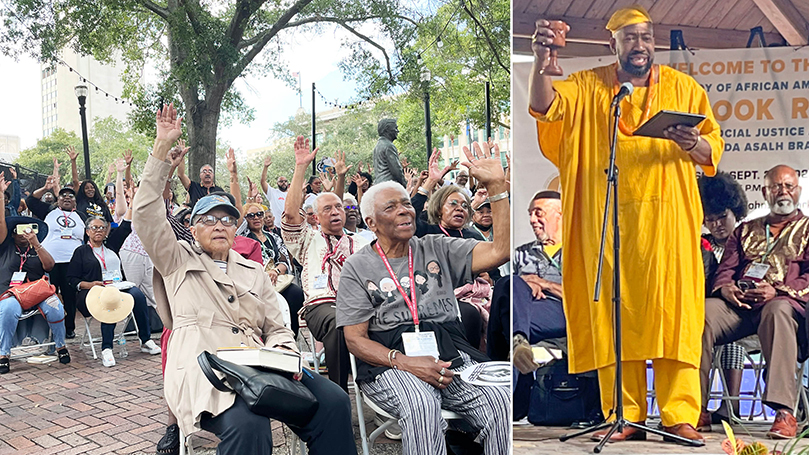
Marx also writes about how resistance to slavery could result in resistance to capitalism. He kept a close eye on insurrections unfolding around the world. Anderson suggests Marx “seemed to perceive a mass slave insurrection as the key to abolition, and perhaps something more in terms of challenging the capitalist order itself.”
It is now 2023, and capitalism is alive and well in most countries around the world. Marx’s idea that a mass slave insurrection will lead to “challenging the capitalist order” is a slow-moving process.
While there have been waves of resistance throughout history in the U.S., we have yet to seriously challenge capitalism. Multiple states this year passed laws limiting discussion of race and racism in K–12 schools and few states mandate Black History.
But African Americans continue to resist. This latest movement against the banning of Black History is growing. In Florida, ASALH launched a pilot for a Freedom School, with no connection to public schools. The outreach program happens in the summer with the goal of teaching students about not just slavery, but the vast landscape of African history. ASALH also released a teaching toolkit at their conference. At the same time ASALH members gathered for their conference, the Congressional Black Caucus Annual Legislative Caucus was underway in Washington D.C. discussing the same issues of resistance. Another non-profit organization, Faith in Florida (FIF), released a toolkit containing lesson plans, reading and video for faith leaders, community groups or anyone dedicated to teaching Black history “through the lens of truth.” And it’s not just Black churches requesting support. FIF officials say white faith leaders and Muslims are asking for toolkits for their congregations. There are teachers who are organizing banned book reading sessions outside of the classroom, and neighborhood associations are organizing, too.
ASALH President Marvin Dulaney opened the conference saying: “ASALH is not only pushing back on anti-wokeness, but it is also pushing back against the racist violence that African Americans have suffered throughout American history.” In one of the last sessions on the last day of the conference, one conference-goer said, “The opposite of woke is sleep.”
Images: CPUSA


 Join Now
Join Now